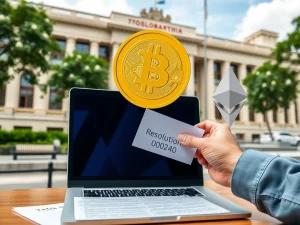Urgent: Brazil Crypto Tax Ends Exemption, Imposes Flat 17.5% Rate

Significant news from South America: Brazil has implemented a major change to its cryptocurrency taxation rules. If you hold or trade digital assets in Brazil, this update to the Brazil crypto tax structure is crucial for you to understand.
What’s Changing with the Brazil Crypto Tax?
Previously, Brazil offered a tax exemption for individuals who sold up to 35,000 Brazilian reals (approximately $6,300) in crypto assets per month. This exemption was a significant benefit for small-scale traders and investors.
Under the new rule, introduced via Provisional Measure 1303, this exemption is gone. Instead, a flat 17.5% tax rate is now applied to all capital gains derived from cryptocurrency sales, regardless of the transaction size. This change became effective on June 12.
Understanding the New Crypto Tax Brazil Structure
The previous system featured a progressive tax rate for gains exceeding the monthly exemption threshold, starting at 15% and going up to 22.5% for very large gains (over 30 million Brazilian reals). The new crypto tax Brazil system simplifies this to a single rate.
Here’s a simple comparison:
- Old Rule: Exemption up to R$35k/month; progressive tax (15%-22.5%) above that.
- New Rule: Flat 17.5% tax on all gains, no monthly exemption.
This shift means smaller investors who previously paid no tax will now pay 17.5% on their gains. Conversely, high-net-worth individuals making large trades (previously taxed up to 22.5%) could see their effective tax rate decrease under the new flat 17.5%.
Expanding the Scope of Brazil Crypto Regulation
The Provisional Measure also broadens the tax base significantly. Under the updated Brazil crypto regulation, crypto assets held in self-custody wallets are now explicitly included in the tax regime. This means gains realized from selling crypto directly from your own wallet are taxable.
Furthermore, foreign crypto holdings are also brought under this tax rule. Brazilian residents must now account for and pay the 17.5% tax on gains from digital assets held on offshore exchanges or in foreign wallets.
Taxation will be assessed quarterly. Investors are allowed to offset losses from the previous five quarters against current gains, though the window for loss deduction is expected to tighten starting in 2026.
Why the Change in the Crypto Tax Rate?
The government’s primary motivation for this tax overhaul is to increase revenue. Provisional Measure 1303 is part of a broader effort to boost tax collection from financial market activities.
This move follows a previous attempt by the finance ministry to raise revenue through a hike in the Financial Transaction Tax (IOF), which was withdrawn after facing opposition from the market and Congress. The current changes to the crypto tax rate and other financial instruments appear to be the government’s alternative approach.
Beyond Crypto: Impact on Other Capital Gains
It’s worth noting that the Provisional Measure extends beyond just cryptocurrencies. Certain fixed income instruments that were previously exempt from income tax, such as LCAs, LCIs, CRIs, and CRAs, will now face a 5% tax on profits. Taxation on betting revenue has also increased from 12% to 18%.
This indicates a broader strategy by the Brazilian government to increase taxation across various forms of crypto capital gains and other investment profits.
Looking Ahead: Potential for Bitcoin Salaries
In separate legislative developments, Brazilian lawmakers have considered proposals that would allow employers to pay workers partially in cryptocurrencies like Bitcoin (BTC). While not directly related to the tax changes, this shows the government is actively considering the role of digital assets in the economy.
Under the proposed rules, crypto payments could not exceed 50% of a standard employee’s salary. Full crypto payments would generally be limited to foreign workers or contractors under specific conditions.
Conclusion
Brazil’s decision to end the crypto tax exemption and implement a flat 17.5% rate marks a significant shift in its approach to digital asset taxation. While simplifying the system, it increases the tax burden for smaller investors while potentially reducing it for larger ones. The inclusion of self-custody and offshore holdings expands the reach of the new Brazil crypto tax rules, requiring all Brazilian crypto holders to be mindful of their obligations. This move is part of a wider government strategy to boost revenue through financial market taxation, signaling a more mature, though perhaps less favorable for small investors, regulatory environment for cryptocurrencies in Brazil.









